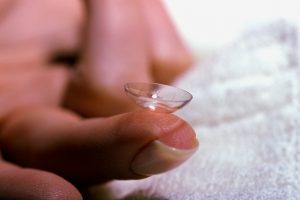
The study found that the drug-administering contact lenses could lower eye pressure in monkeys with glaucoma just as effectively as the standard eye drops.
Co-author Dr. Janet Serle said, “This promising delivery system removes the burden of administration from the patient and ensures consistent delivery of medication to the eye, eliminating the ongoing concern of patient compliance with dosing.”
Current glaucoma treatment is delivered through eye drops, but if patients have difficulty administering the eye drops, they may not be able to follow treatment as prescribed.
First author Dr. Joseph Ciolino added, “If we can address the problem of [people not using their eye drops as directed], we may help patients adhere to the therapy necessary to maintain vision in diseases like glaucoma, saving millions from preventable blindness. This study also raises the possibility that we may have an option for glaucoma that’s more effective than what we have today.”
Study senior author Dr. Daniel Kohane explained, “Instead of taking a contact lens and allowing it to absorb a drug and release it quickly, our lens uses a polymer film to house the drug, and the film has a large ratio of surface area to volume, allowing the drug to release more slowly.”
The medication is stored on the outer edges of the lenses, so it does not obstruct vision. Furthermore, the contacts can be customized to fit a person’s prescription.